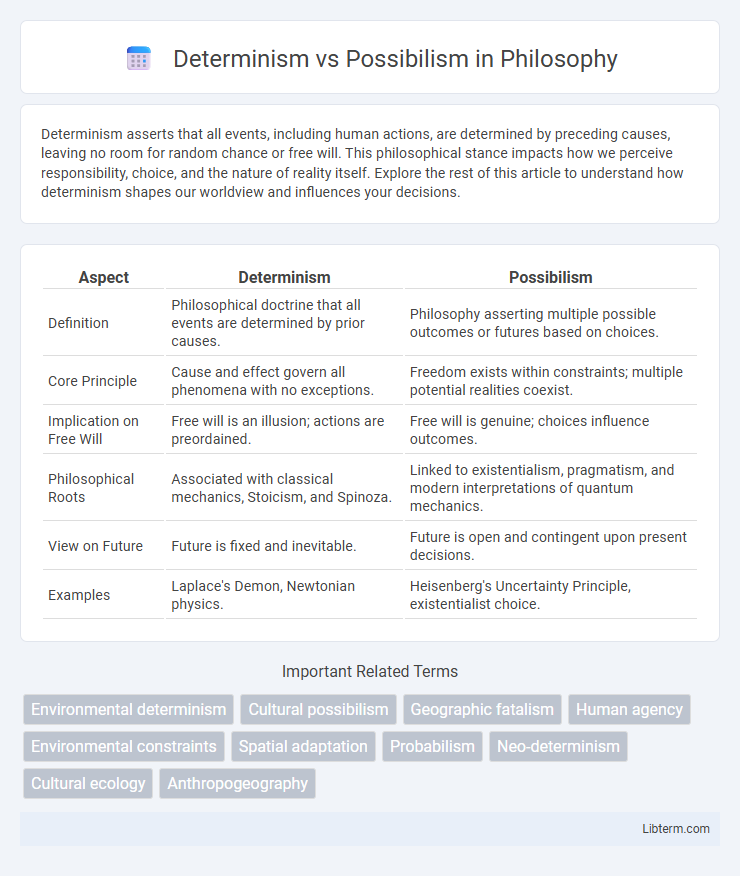Determinism asserts that all events, including human actions, are determined by preceding causes, leaving no room for random chance or free will. This philosophical stance impacts how we perceive responsibility, choice, and the nature of reality itself. Explore the rest of this article to understand how determinism shapes our worldview and influences your decisions.
Table of Comparison
| Aspect | Determinism | Possibilism |
|---|---|---|
| Definition | Philosophical doctrine that all events are determined by prior causes. | Philosophy asserting multiple possible outcomes or futures based on choices. |
| Core Principle | Cause and effect govern all phenomena with no exceptions. | Freedom exists within constraints; multiple potential realities coexist. |
| Implication on Free Will | Free will is an illusion; actions are preordained. | Free will is genuine; choices influence outcomes. |
| Philosophical Roots | Associated with classical mechanics, Stoicism, and Spinoza. | Linked to existentialism, pragmatism, and modern interpretations of quantum mechanics. |
| View on Future | Future is fixed and inevitable. | Future is open and contingent upon present decisions. |
| Examples | Laplace's Demon, Newtonian physics. | Heisenberg's Uncertainty Principle, existentialist choice. |
Understanding Determinism: Definition and Key Concepts
Determinism is the philosophical doctrine that all events, including human actions, are determined by preceding causes and natural laws, leaving no room for randomness or free will. Key concepts include causal determinism, which asserts that every effect has a cause, and logical determinism, which holds that propositions about the future are already true or false. Understanding determinism involves exploring the implications of these ideas on human decision-making, responsibility, and the predictability of natural phenomena.
Exploring Possibilism: A Modern Perspective
Possibilism highlights human agency and innovation as key factors shaping geographic and social outcomes, countering strict environmental determinism. Modern perspectives emphasize how technological advances and cultural adaptations allow societies to overcome natural constraints and influence development paths. This approach underlines the dynamic interplay between environmental conditions and human choices in shaping sustainable futures.
Historical Evolution of Environmental Thought
Determinism, rooted in early 20th-century geography, views human activities as tightly constrained by the physical environment, emphasizing a unidirectional influence from nature to society. Possibilism emerged as a critical response in the mid-20th century, highlighting human agency and technological innovation as key determinants that enable societies to overcome environmental limitations. This historical evolution in environmental thought reflects a shift from environmental determinism's rigid causality to possibilism's recognition of human choice and adaptability within ecological contexts.
Core Differences Between Determinism and Possibilism
Determinism asserts that all events, including human actions, are predetermined by external factors such as geography, environment, and social conditions, leaving no room for individual choice. Possibilism, on the other hand, emphasizes human agency and decision-making, suggesting that while environment influences options, people have the capacity to choose from multiple possibilities. The core difference lies in determinism's focus on environmental constraints as absolute causes, whereas possibilism highlights human creativity and adaptability within those constraints.
Influence of Geography on Human Societies
Determinism asserts that geographic factors such as climate, landforms, and natural resources rigidly shape human societies and their development paths. Possibilism argues that while geography sets certain constraints, human agency and cultural innovation largely determine societal outcomes. The debate highlights how physical environments influence agriculture, settlement patterns, and economic activities but allows for human adaptation and technological advancements to overcome geographic limitations.
Prominent Theorists and Their Contributions
Determinism in geography is prominently associated with environmental determinists like Friedrich Ratzel and Ellsworth Huntington, who argued that the physical environment shapes human activities and societal development. Possibilism, advanced by Paul Vidal de la Blache and later Carl Sauer, counters this view by emphasizing human agency and cultural factors as key determinants, positing that humans adapt and make choices within environmental constraints. These theorists significantly shaped geographic thought by framing the debate around whether environment dictates or merely influences human potential and decision-making.
Real-World Examples: Determinism in Practice
Urban planning in flood-prone areas exemplifies determinism, where natural constraints like rivers and topography dictate land use and infrastructure development. Agricultural practices in arid regions also reflect determinism by limiting crop choices based on soil type and precipitation levels. Transportation networks often follow geological features, demonstrating how environmental factors determine spatial organization and connectivity.
Case Studies Highlighting Possibilism
Case studies in urban geography reveal possibilism by illustrating how human choices shape city development despite environmental constraints. For example, the transformation of Singapore from a resource-poor island into a global financial hub demonstrates human agency overcoming natural limitations. Similarly, Dubai's desert-based urban growth showcases strategic planning and technological innovation driving development regardless of environmental determinism.
Contemporary Relevance in Geography and Policy
Determinism and possibilism remain central in contemporary geography, influencing urban planning and environmental policy by shaping how human agency interacts with natural constraints. Possibilism supports adaptive strategies in climate change resilience, emphasizing human creativity in overcoming geographical limitations. Determinism informs risk assessment models by highlighting environmental factors that can restrict development and shape sustainable land use policies.
Future Directions: Towards an Integrated Approach
Future directions in the debate between Determinism and Possibilism emphasize developing an integrated approach that combines deterministic environmental constraints with human agency and adaptability. This synthesis aims to model complex human-environment interactions more accurately, incorporating technological innovation, cultural evolution, and socio-economic factors. Integrating data from geography, sociology, and climate science enables predictive frameworks that balance certainty in environmental influences with the unpredictability of human decision-making.
Determinism Infographic

 libterm.com
libterm.com